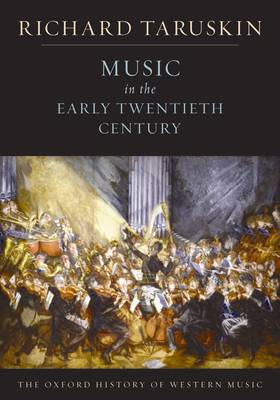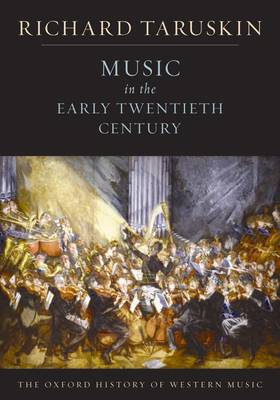
Je cadeautjes zeker op tijd in huis hebben voor de feestdagen? Kom langs in onze winkels en vind het perfecte geschenk!
- Afhalen na 1 uur in een winkel met voorraad
- Gratis thuislevering in België vanaf € 30
- Ruim aanbod met 7 miljoen producten
Je cadeautjes zeker op tijd in huis hebben voor de feestdagen? Kom langs in onze winkels en vind het perfecte geschenk!
- Afhalen na 1 uur in een winkel met voorraad
- Gratis thuislevering in België vanaf € 30
- Ruim aanbod met 7 miljoen producten
Zoeken
€ 50,95
+ 101 punten
Omschrijving
The universally acclaimed and award-winning Oxford History of Western Music is the eminent musicologist Richard Taruskin's provocative, erudite telling of the story of Western music from its earliest days to the present. Each book in this superlative five-volume set illuminates-through a representative sampling of masterworks-the themes, styles, and currents that give shape and direction to a significant period in the history of Western music. Music in the Early Twentieth Century, the fourth volume in Richard Taruskin's history, looks at the first half of the twentieth century, from the beginnings of Modernism in the last decade of the nineteenth century right up to the end of World War II. Taruskin discusses modernism in Germany and France as reflected in the work of Mahler, Strauss, Satie, and Debussy, the modern ballets of Stravinsky, the use of twelve-tone technique in the years following World War I, the music of Charles Ives, the influence of peasant songs on Bela Bartok, Stravinsky's neo-classical phase and the real beginnings of 20th-century music, the vision of America as seen in the works of such composers as W.C. Handy, George Gershwin, and Virgil Thomson, and the impact of totalitarianism on the works of a range of musicians from Toscanini to Shostakovich
Specificaties
Betrokkenen
- Auteur(s):
- Uitgeverij:
Inhoud
- Aantal bladzijden:
- 880
- Taal:
- Engels
- Reeks:
Eigenschappen
- Productcode (EAN):
- 9780195384840
- Verschijningsdatum:
- 27/07/2009
- Uitvoering:
- Paperback
- Formaat:
- Trade paperback (VS)
- Afmetingen:
- 180 mm x 251 mm
- Gewicht:
- 1542 g

Alleen bij Standaard Boekhandel
+ 101 punten op je klantenkaart van Standaard Boekhandel
Beoordelingen
We publiceren alleen reviews die voldoen aan de voorwaarden voor reviews. Bekijk onze voorwaarden voor reviews.









